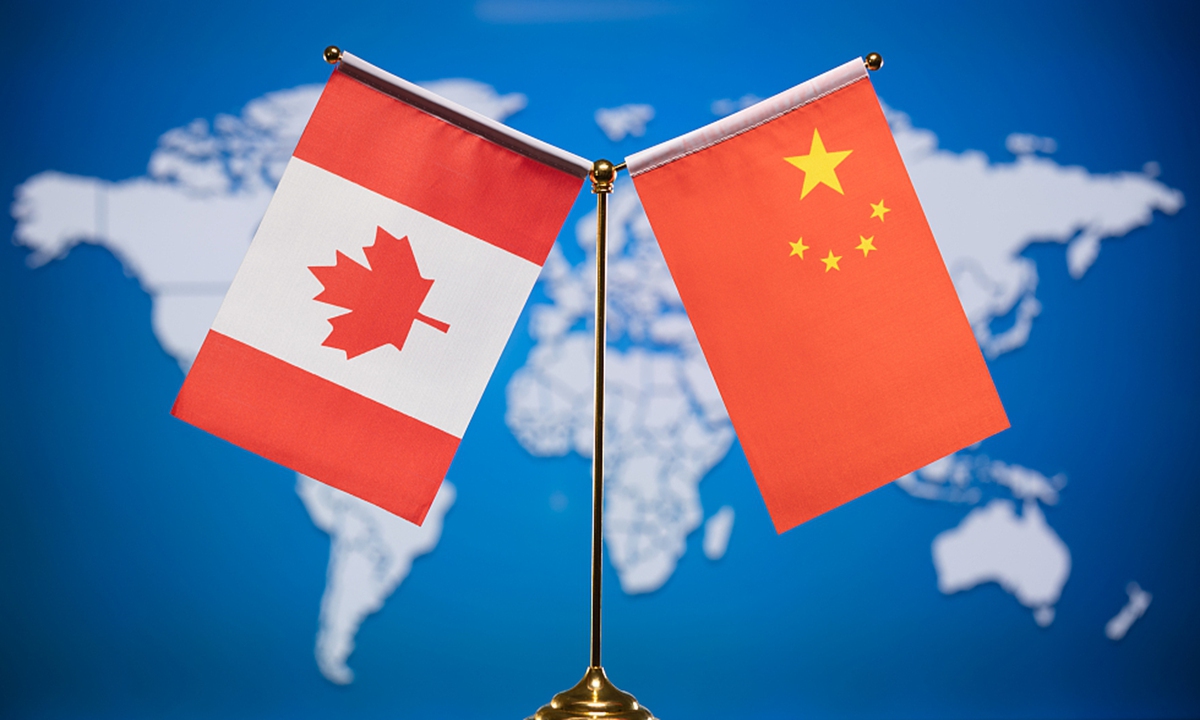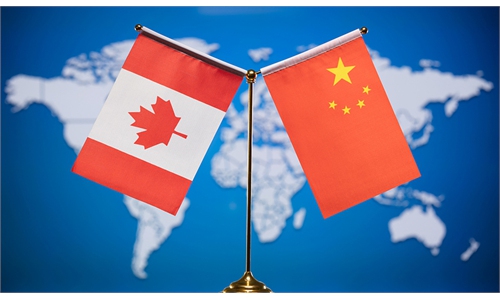China resolutely objects to Canada’s clampdown on researchers with ties to China citing unfounded national security risks as pretext

China Canada Photo: VCG
China expresses strong dissatisfaction and resolute objection against Canada and has lodged a solemn representation with the Canadian side who has politicized regular scientific and technological exchanges and cooperation, undermining the openness, trust and collaboration in the scientific and technological sectors between the two countries under the pretext of baseless national security risks, Chinese Embassy in Canada said on Tuesday in response to Canada’s clampdown on researchers with ties to China.
The federal government of Canada on Tuesday unveiled a list of mainly China-based universities, which it said represent the “highest risk to Canada’s national security,” to stop the related researchers working on subjects deemed sensitive or critical to Canadian national security.
The federal government also released what it called a list of “sensitive” research areas — including advanced weapons, quantum technologies, robotics, aerospace, space and satellite technology and medical and health-care technology.
The universities are mostly based in China with a few from Iran and Russia also included on the list.
In measures Canada said were aimed at shielding advanced and emerging technologies, government grants will not be provided to researchers with links to universities connected to defense and security entities of China, Iran and Russia that could harm security, according to a report from Reuters.
In response to Canada’s latest move, the spokesperson of the Chinese Embassy in Canada said on Tuesday that China expresses strong dissatisfaction and resolute objection against Canada and has lodged a solemn representation with the Canadian side who has politicized regular scientific and technological exchanges and cooperation, undermining the openness, trust and collaboration in the scientific and technological sectors between the two countries under the pretext of unfounded national security risks.
According to the spokesperson, China’s efforts and achievements in technological innovation have been widely recognized. In 2022, China’s total investment in research and development (R&D) exceeded 3 trillion yuan ($418.2 billion), making it the world’s second-largest economy in terms of R&D spending.
According to the Global Innovation Index 2023 released by the World Intellectual Property Organization (WIPO), China ranks 12th globally. Recently, China proposed the “International Science and Technology Cooperation Initiative,” advocating for and practicing an open, fair, equitable and non-discriminatory international science and technology cooperation. China has called for exploring solutions to global issues through technological innovation cooperation to jointly promote peaceful development, the spokesperson said.
The spokesperson stressed that the scientific and technological exchange and cooperation between China and Canada are two-way and mutually beneficial. The Canadian side’s politicization and weaponization of issues related to scientific and technological cooperation represent a narrow-minded “small yard, high fence” approach.
We urge the Canadian side to immediately correct its erroneous actions, discard ideological biases and Cold War mentality, cease the abuse of tools like “lists” to constrain and suppress Chinese academic institutions, building a favorable environment for open and free international scientific and technological cooperation, the spokesperson added, noting that will only harm both parties involved otherwise.
In response to the measures Canada said were aimed at shielding advanced and emerging technologies from being shared with countries including China, Chinese Foreign Ministry spokesperson Mao Ning said during a press briefing on Wednesday that Canada’s clampdown on Chinese universities and scientific research institutions citing unfounded national security risks as pretext seriously undermines the sci-tech exchange and cooperation between the two countries and is not conducive to improving and stabilizing the bilateral relations.
Mao said that the sci-tech exchange and cooperation between the two countries are two-way and mutually beneficial, and Canada’s relevant policies deemed to be shortsighted and unwise, hurting others as well as itself.
We urge Canada to abandon its ideological biases and Cold War mentality, stop overstretching the concept of national security, stop politicizing sci-tech cooperation issues and using them as a tool, stop setting up barriers hindering normal sci-tech exchanges and cooperation between China and Canada, in a bid to create conditions and an atmosphere for the improvement and development of the bilateral relations between the two countries, rather than taking actions which work to the contrary, Mao said.
Global Times


